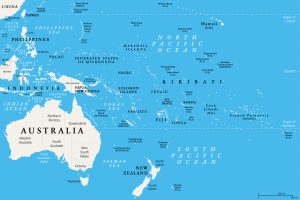Climate diplomacy efforts in the Pacific are an integral part of Australian foreign policy under Prime Minister Anthony Albanese. After taking office in 2022, Albanese formally reinstated an Australian ambassador for climate change. The ambassador plays a leading and pivotal role in global climate advocacy, including in engagements with Australia’s climate-vulnerable Pacific neighbors. The Department of Foreign Affairs and Trade has subsequently been at the forefront of Australia’s international response to climate change through various multilateral organizations. The Albanese government’s renewed commitment was welcomed by Pacific Island leaders at the 2022 Pacific Islands Forum (PIF) Leaders’ Meeting.
One venue through which Canberra could further advance the collective climate policies of its Pacific family is the Asia-Pacific Economic Cooperation (APEC) forum. Even though it covers more than 800,000 square kilometers, the Pacific Island region remains grossly underrepresented in one of the Asia-Pacific’s premier multilateral organizations. At present, the 21-member APEC bloc only includes three members from PIF – Australia, New Zealand, and Papua New Guinea (PNG) – and none of the region’s small island nations.
APEC aims to create economic prosperity for the people of the Asia-Pacific by promoting balanced, inclusive, and sustainable economic growth in the region. The grouping can further strengthen this key pillar by embedding and institutionalizing Pacific Islander voices within APEC.
As PIF’s largest member state, Australia could advance the collective climate policies of its Pacific neighbors through APEC at the group’s summit in South Korea later this month. This would also align with the South Korean Presidency’s theme of “Building a Sustainable Tomorrow.” A key priority of this year’s summit is to address pressing global issues like climate change and to accelerate the region’s transition to clean energy.
With a renewed sense of purpose in its Pacific leadership, Australia should advocate for the full APEC membership of the PIF Secretariat at this year’s summit. At present, PIF is an observer of the grouping, and as mentioned, of the Pacific Island nations, only PNG is a full member of APEC. PIF’s participation will boost the Pacific Island states’ collective climate advocacy in the region and give it a substantial voice on regional and global climate change issues that disproportionately affect the Pacific. This aligns with Foreign Minister Penny Wong’s foreign policy priority of amplifying the collective Pacific voice on the international stage. Additionally, it will give Australia’s climate advocacy and leadership further legitimacy and weight within APEC.
Last year, under APEC’s Emergency Preparedness Working Group, member states deepened cooperation in disaster prevention and risk reduction. APEC countries are advancing climate change adaptation initiatives in vulnerable communities through the use of early warning and risk alert systems and the development of infrastructure for climate resiliency.
The urgent need to address climate change is imperative for the survival of Pacific Island nations. They are among the countries most vulnerable to climate change, and Pacific communities are on the frontlines of the global climate crisis. Albanese acknowledged this fact in 2023 when he stated that “we recognize the climate crisis is the single greatest threat to the livelihoods, security, and well-being of people in the Pacific.” In fact, the climate crisis is so dire for Canberra’s Pacific neighbors that Pacific countries like Tuvalu and the Marshall Islands could become uninhabitable sometime this century.
Australia’s climate diplomacy efforts in the Pacific have been given a further boost with its recently announced official development assistance budget for 2025-26, pledging a record A $2.157 billion to the Pacific. A substantial amount of this funding is going to support the region’s climate resilience and mitigation objectives. Additionally, Canberra will contribute funding for the Tuvalu Coastal Adaptation Project, which will expand the nation’s land by around 6 percent.
Full PIF membership will also strengthen APEC’s climate change agenda. In 2014, the grouping agreed to work toward doubling the share of renewables in APEC’s energy mix by 2030. As of 2023, 19 of APEC’s 21 economies have declared commitments to achieving net-zero carbon emissions by 2050 or 2060. However, APEC economies still account for 60 percent of global carbon dioxide emissions.
In 2022, APEC formally adopted the Bangkok Goals on Bio-Circular-Green Economy. The goals aim to enhance climate adaptive capacity in the Asia-Pacific. They also recognize the urgent need to collectively address climate change and reduce greenhouse gas emissions and the need to provide international support to climate adaptive capacity building. Additionally, the APEC Climate Center provides climate prediction data and transfers related technologies to vulnerable climate countries in the Asia-Pacific region so that they can adapt effectively to the climate crisis. Pacific Island countries are indeed desperate to build their own climate adaptation capacities and ensure that the needs of vulnerable Pacific Island communities are met.
All of these APEC initiatives would likely be strengthened by the full membership and substantive participation of the Pacific Island nations.
The APEC project was first conceived by Australian Prime Minister Bob Hawke in 1989. Ten months later, 12 Asia-Pacific economies met in Canberra to formally establish the grouping. Since then, the regional economic forum has grown to become one of the top-tier multilateral blocs in the world. The meeting between U.S. President Joe Biden and China’s President Xi Jinping at the 2023 APEC Summit once again showcased the global political importance of the grouping.
Ultimately, Australia can leverage its Pacific leadership and APEC membership to promote Pacific representation in peak international forums and continue to champion climate action through multilateral organizations like APEC. In the long term, this could advance and strengthen resilience to climate change in Australia’s immediate region.





























